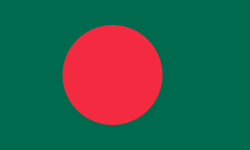This article only references primary sources.(December 2024) |
| People's Republic of Bangladesh Adviser of Land | |
|---|---|
| বাংলাদেশের ভূমি উপদেষ্টা | |
 | |
 | |
| Style |
|
| Type | Cabinet Minister |
| Status | Adviser |
| Member of | |
| Reports to | |
| Seat | Bangladesh Secretariat |
| Nominator | Chief Adviser of Bangladesh |
| Appointer | President of Bangladesh on the advice of the chief adviser |
| Term length | Interim or the chief adviser's pleasure |
| Formation | 20 January 1972 |
| Salary | ৳245000 (US$2,000) per month (incl. allowances) |
| Website | minland |
The minister of land is the minister in charge of the Ministry of Land in the government of Bangladesh. He is also the minister of all departments and agencies under the Ministry of Land. [1] [2]
